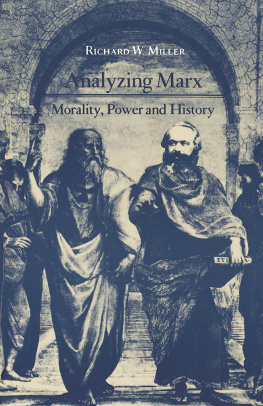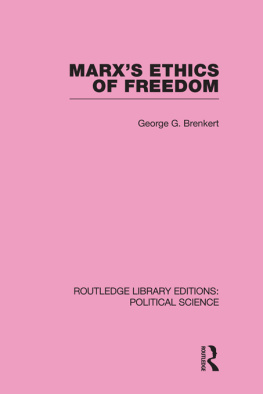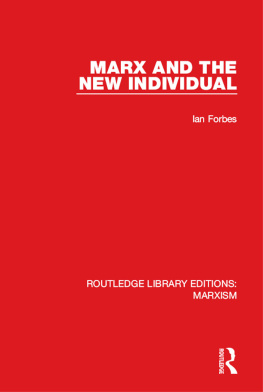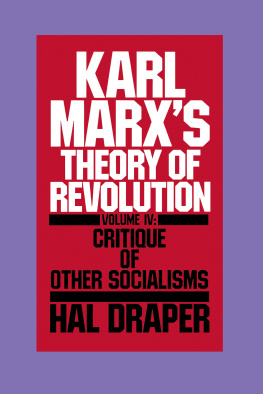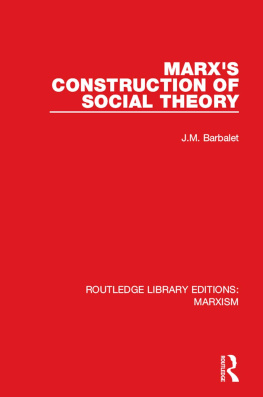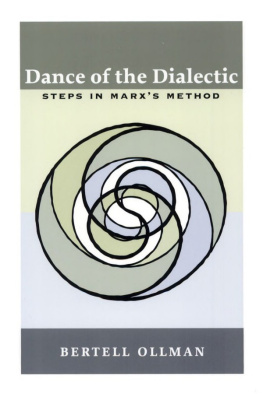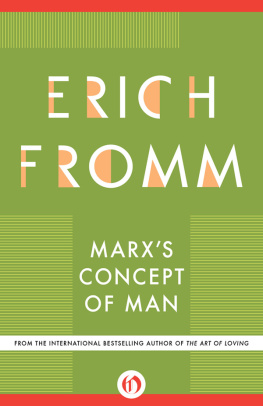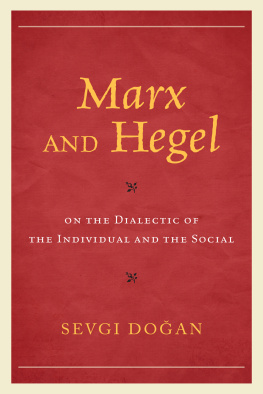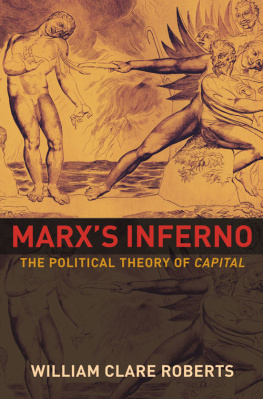ANALYZING MARX
Analyzing Marx
Morality, Power and History
RICHARD W. MILLER
Princeton University Press
Copyright 1984 by Princeton University Press
Published by Princeton University Press, 41 William Street, Princeton, New Jersey 08540
In the United Kingdom: Princeton University Press, Guildford, Surrey
All Rights Reserved
Library of Congress Cataloging in Publication Data will be found on the last printed page of this book
ISBN 0-691-06613-2 (cloth) 0-691-01413-2 (pbk)
eISBN: 978-0-691-21974-5
R0
To Peggy
A Note on References
THE WORKS by Marx to which I most frequently refer will be cited in the following editions:
Marx, Economic and Philosophical Manuscripts (1844), in T. B. Bottomore, ed., Early Writings (New York, 1964).
Marx and Engels, The German Ideology (1846), ed. C. J. Arthur (New York, 1980).
Marx and Engels, Manifesto of the Communist Party (1848), in Marx and Engels, The Marx-Engels Reader, ed. Robert C. Tucker, 1st ed. (New York, 1972).
Marx, Wage-Labor and Capital (1849), in Marx-Engels Reader.
Marx, The Eighteenth Brumaire of Louis Bonaparte (1852), in Marx-Engels Reader.
Marx, Grundrisse (185758), trans. M. Nicolaus (New York, 1973).
Marx, Preface to A Contribution to the Critique of Political Economy (1859), in Marx and Engels, Selected Works in Three Volumes (Moscow, 1973), vol. I.
Marx, Wages, Price and Profit (1865), in Selected Works, vol. II.
Marx, Capital (1867, etc.), (Moscow, n.d.)
Marx, The Civil War in France (1871), in Marx-Engels Reader.
Marx, Critique of the Gotha Program (1875), in Marx-Engels Reader.
Marx and Engels, Selected Correspondence (Moscow, n.d.)
ACKNOWLEDGMENTS
Some of my work on this book was done during a sabbatical year which was partly supported by a Rockefeller Foundation Humanities Fellowship. Parts of appear in the following essays of mine, and are used here with permission of the publishers:
Marx and Morality in Marxism: Nomos XXVI, ed. J. Roland Pennock and John W. Chapman. Copyright 1983 by New York University.
Productive Forces and the Forces of Change in the Philosophical Review, 90 (1981).
Producing Change in Terence Ball and James Farr, ed., After Marx, Cambridge University Press.
ANALYZING MARX
Introduction
THIS BOOK has two goals. One is to show that Marx should be a central figure in non-Marxist philosophy. He serves important needs that all philosophers share. The other is to develop a more political interpretation of Marx, in which powerrelations, rather then technology, and struggles for power, pursued outside of the workplace, typically play a primary role. Readers now have to choose between economic determinist approaches that underrate political structures and conflicts, and eclectic interpretations that ignore Marxs obvious, pervasive and distinctive emphasis on economic processes. I will be developing a third kind of alternative.
These goals are closely related. Despite the grand metaphysical sound of some economic determinist statements, the more political version of Marx makes him more philosophically useful. On the other hand, the style and skills of contemporary philosophy, which have created clearer and more flexible readings of philosophers from Plato to Kant, are just what is needed to develop interpretations of Marx that are neither narrowly economic nor piecemeal. The interdependence and urgency of these goals will, I hope become clearer as I discuss them more, in turn.
USES FOR MARX, USES FOR PHILOSOPHY
If the arguments of this book are right, Marx should play a central role in any style of philosophy. However, my case for Marx is most explicitly addressed to one way of doing philosophy, analytic philosophy, as it is called by its practitioners and, even more commonly, by its enemies. This is the dominant way of doing philosophy in English-speaking countries. It is also the hardest case for the view that Marx should be central to philosophy, since it is the most important approach in which Marx is treated as a marginal figure.
This philosophical subculture (in which I largely function) is held together not by common doctrines but by common standards of successful practice. Above all, there is a heavy emphasis on clear statements of what one wants people to believe and clear arguments as to why they should believe it, based on premises that would be plausible to many, if not all. Historically, substantive philosophical assumptions, first derived from British empiricism and reinforced by logical positivism, have played an important role when philosophy is done in this style. But now those assumptions are often questioned, in the analytic way. This book is meant to contribute to that questioning, by showing that Marx is best read and best used when the style of analytic philosophy is divorced from positivist substance.
When analytic philosophers look at the history of philosophy, they discern certain classical figures, usually the same as everyone elses. Hume on virtually every topic and Mill in ethics are two uncontroversial examples. To be a classic, here, is not to be recognized as having been right, or even as having been most correct among the alternatives that were available. Rather, the classics represent standard options that a philosopher should consult, supporting, amending, interpreting or attacking them, as he or she does philosophy. It is in this sense that Marx should be a classic for modern philosophy, including analytic philosophy.
To the contrary, in English-speaking countries, the relation between Marx and philosophy has been almost wholly antagonistic, at least until very recently. Almost all analytic philosophers, if they did not ignore Marxs writings, tried to show that Marx fell so far short of proper standards of clarity, plausibility, scientific justification or explanatory adequacy that it would be a waste of time to investigate his theories empirically or to derive their philosophical implications. Metaphysics was one of the nicer charges.
This antagonism should be replaced by cooperation, of at least three important kinds. First, some of Marxs ideas shed light on leading problems of philosophy, issues that are important not just for Marxists (or anti-Marxists), but for everyone. For example, in the first two chapters I shall try to show that Marxs criticism and replacement of justice, equality and the moral point of view, as bases for judging social arrangements, ought to be a standard position in ethics. His arguments are as central as the question, How should institutions be judged? In I will use Marxs theory of history as a model of the kind of legitimate theory that positivist philosophy of science excludes, and base a sketch of post-positivist but nonrelativist philosophy of science on the logical structure of this theory.
In the second place, philosophers can use Marxs writings to make a positive contribution to the social sciences. Social and political philosophers and philosophers of science are now separated from social scientists by frustrating departmental divides. Lacking appropriate training, information or professional rewards, philosophers today, quite unlike their most eminent predecessors, find it hard to contribute to actual debates over the nature of social reality. Yet many social scientists suspect that distinctive possibilities of analysis and explanation are being missed as a result of the easy assumptions and the confusions that philosophical reflection should challenge. As the most powerful explanatory framework outside the mainstream, Marxs social theories often yield such alternatives, if reconstructed with the clarity and conceptual resourcefulness of contemporary analytic philosophy. In I use Marxs writings in this spirit, to show that assessments of political power are incomplete, unless Marxs distinctive concept of power is used as one yardstick. Similar analyses of Marxs ideas might have a liberating effect elsewherefor example, in breaking the deadlock between formalism and substantivism in economic anthropology, or in determining the scope and limits of economic theory, in a world where equilibrium arguments are increasingly vacuous and the impact of international politics on economic processes is increasingly pervasive.

